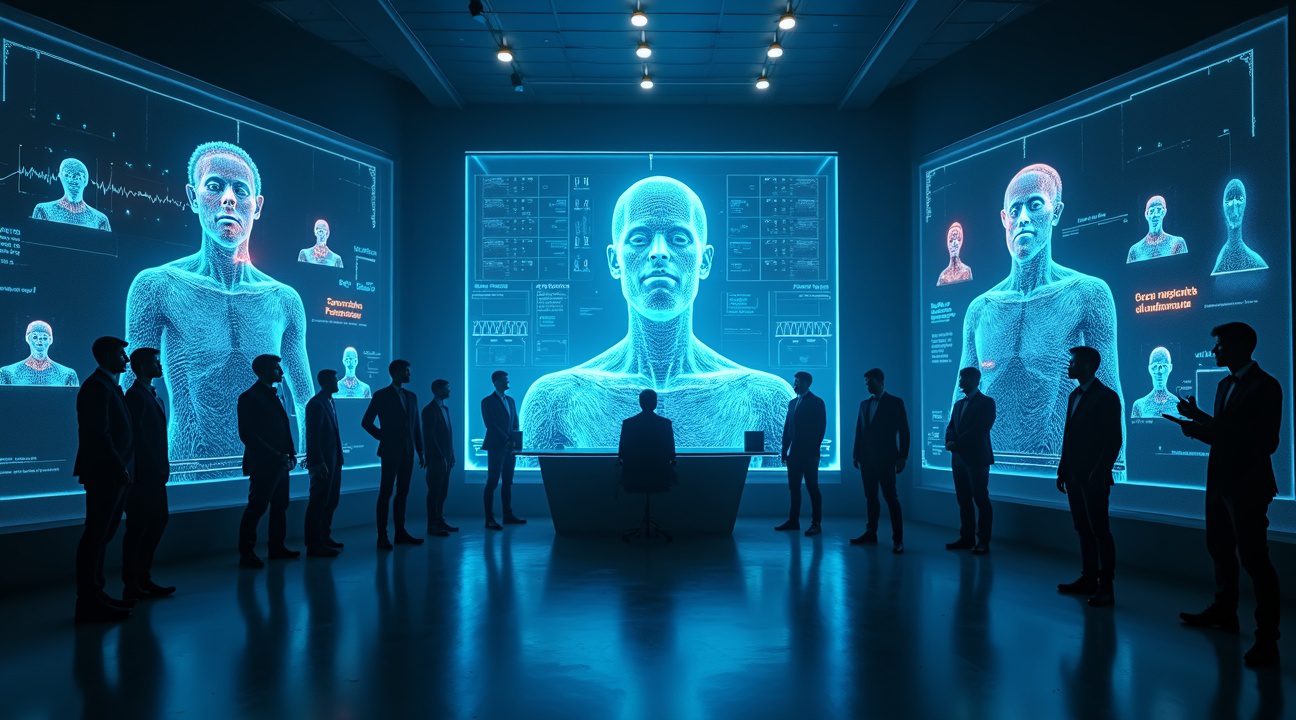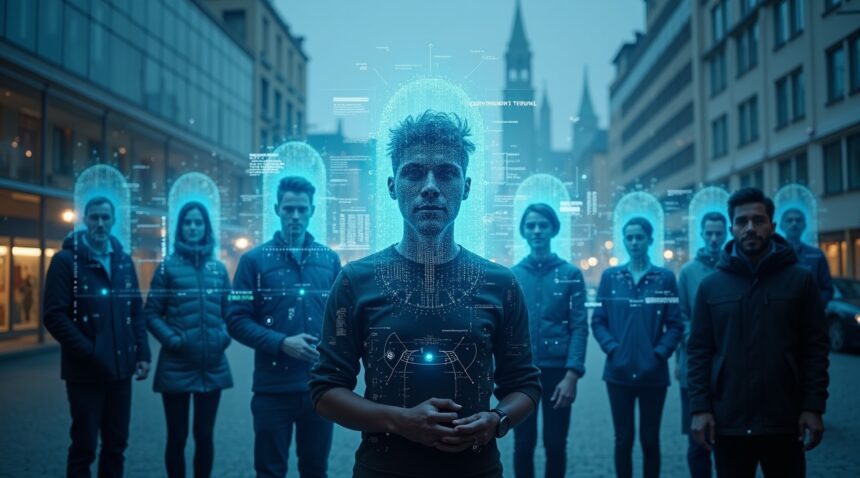Denmark has made history by legally recognizing citizens’ biometric data—such as faces, voices, and bodies—as personal property, establishing unprecedented digital rights protections for individuals.
Key Takeaways
- Full ownership rights: Danish citizens now have copyright-like control over their face, voice, and body. These are treated as forms of intellectual property, akin to literary or artistic works.
- Immediate takedown authority: Individuals can demand the removal of any synthetic or AI-generated content that uses their likeness without consent. Platforms that fail to comply may incur considerable fines.
- Lifetime plus 50-year protection: This groundbreaking legislation ensures biometric protection throughout an individual’s life and for 50 years after death. During that time, an estate executor manages usage rights.
- Financial compensation rights: Citizens can seek compensation for unauthorized commercial use of their likeness, even without proving specific harm. This law assumes personal identity has intrinsic commercial value.
- Global policy influence: Denmark’s legal model may influence other EU nations and global legislators, especially as Denmark assumes the EU Council presidency in 2025 and takes a leadership role in digital rights advocacy.
For a deeper look into how this new Danish law might shape global standards around biometric rights and digital identity, you can explore more insights provided by Euractiv’s coverage.
Denmark Grants Every Citizen Ownership Rights Over Their Face, Voice, and Body
Denmark has taken an unprecedented step by becoming the first nation to legally classify an individual’s face, voice, and body as intellectual property. This groundbreaking legislation fundamentally changes how we think about personal identity in the digital age, transforming what was once considered biometric data into tangible, ownable assets.
From Privacy Protection to Actual Ownership
The Danish law represents a complete paradigm shift from traditional privacy protection measures. Rather than simply shielding citizens from unauthorized use of their likeness, this legislation grants them full ownership rights over their physical and vocal attributes. Every citizen now possesses copyright-like control over their face, voice, and body, regardless of their fame or public status.
This approach treats personal characteristics as intellectual property similar to how copyright protects creative works. Citizens can now exercise ownership and sovereignty over their digital identity in ways previously reserved for celebrities and public figures. The law doesn’t just protect against misuse—it establishes fundamental ownership that citizens can enforce and monetize.
Legal Framework and Digital Rights
Under this new framework, Danish citizens gain several powerful rights over their personal likeness:
- The right to demand immediate takedowns of unauthorized uses of their image, voice, or physical likeness
- The ability to seek compensation when their likeness generates commercial value without consent
- Legal standing to pursue damages for unauthorized use, even without proving specific harm
- Control over how AI systems and deepfake technology can use their biometric data
This legislation addresses growing concerns about digital identity theft, deepfake technology, and unauthorized AI training on personal data. The law positions personal physical attributes as valuable assets that deserve the same protection afforded to other forms of intellectual property.
The Danish model could influence how other nations approach digital identity protection and personal rights in an increasingly connected world. By establishing ownership rather than just privacy rights, Denmark has created a framework that empowers citizens to control their digital presence actively.
This revolutionary approach to personal likeness protection demonstrates Denmark’s leadership in digital rights legislation. The law provides citizens with concrete tools to protect their identity while creating potential revenue streams from their own physical characteristics—a concept that seemed impossible just years ago.

Three Core Rights Every Danish Citizen Now Possesses
Denmark’s groundbreaking legislation grants every citizen three fundamental rights that protect their personal likeness from unauthorized digital manipulation. These rights activate automatically at birth and require no registration or formal claim to enforce.
Immediate Protection Against Digital Misuse
The Right of Removal empowers individuals to demand takedowns of any AI-generated or synthetic media featuring their face, voice, or body without consent. This protection extends beyond malicious deepfakes to include any unauthorized digital reproduction, regardless of intent. Citizens can issue takedown requests directly to platforms hosting the content, creating a powerful shield against unwanted digital representation.
Platform liability represents the enforcement mechanism that gives these rights real teeth. Social media platforms and content hosts face substantial fines if they fail to respond rapidly to legitimate takedown requests. This coordinated approach aligns with existing EU Digital Services Act requirements, creating a comprehensive regulatory framework that platforms cannot ignore.
The Right to Compensation allows citizens to claim damages for likeness misuse without proving actual harm or malicious intent. This provision recognizes that unauthorized use of someone’s image carries inherent value, similar to how trademark protection works for commercial brands. Citizens can seek financial compensation even when the unauthorized use doesn’t cause obvious damage to their reputation or livelihood.
These protections include several important exceptions that balance individual rights with free expression. Satire, parody, news reporting, and public-interest content remain protected under the law. These carve-outs ensure that legitimate commentary and journalism can continue while still protecting citizens from exploitative or unauthorized commercial use of their likeness.
The automated rights system means Danish citizens don’t need to register for protection or take proactive steps to secure these rights. Unlike traditional property rights that require documentation or registration, these likeness protections exist from birth and apply universally. This automatic coverage removes barriers that might prevent citizens from protecting themselves against digital misuse.
Platform fines create strong incentives for rapid response to takedown requests. Companies that delay or ignore legitimate removal demands face escalating financial penalties that can reach significant amounts. This enforcement mechanism ensures that citizens’ rights receive prompt attention rather than getting lost in corporate bureaucracy.
The legislation addresses the growing concern over deepfakes and AI-generated content by treating unauthorized likeness use as a property violation. This approach gives citizens clear legal recourse against both malicious actors and well-intentioned users who create synthetic content without permission. Citizens now possess concrete tools to protect their digital identity in an era where anyone can create convincing fake media with readily available technology.
Lifetime Protection Plus 50 Years Beyond Death
Denmark’s groundbreaking legislation establishes an unprecedented protection framework that extends far beyond traditional privacy rights. The new law grants individuals comprehensive control over their personal likeness throughout their entire lifetime, then continues this protection for an additional 50 years after death. This mirrors the structure of copyright law, treating personal identity as intellectual property deserving of the same long-term safeguards.
Comprehensive Biometric Coverage
The legislation covers an extensive range of biometric features and personal characteristics. Facial features receive full protection, meaning any realistic digital imitation of someone’s face requires explicit consent. Voice patterns fall under the same umbrella, preventing unauthorized audio deepfakes or voice cloning without permission. The law also extends to physical mannerisms and body movement, recognizing that personal identity encompasses more than just static features.
Digital imitation technology has advanced rapidly, making it possible to recreate someone’s appearance and mannerisms with startling accuracy. Denmark’s new framework acknowledges this reality by protecting the complete spectrum of personal characteristics that make each individual unique. Whether it’s the way someone walks, gestures, or speaks, these elements now carry legal weight as personal property.
Legacy Protection and Judicial Authority
The 50-year postmortem protection ensures that families can control how deceased relatives’ likenesses are used commercially or otherwise. This legacy protection prevents exploitation of someone’s image after they can no longer advocate for themselves. Estate executors and designated heirs gain the authority to make decisions about posthumous use of the deceased person’s likeness.
Judicial recourse represents one of the most powerful aspects of this legislation. Courts now possess the authority to invalidate identities and assets that were fraudulently obtained using someone’s likeness without permission. This creates serious consequences for bad actors who profit from unauthorized use of personal identity. If someone uses another person’s face or voice to secure financial gains, contracts, or other valuable assets, the courts can essentially reverse those ill-gotten gains.
The enforcement mechanisms go beyond simple takedown requests. Individuals can pursue monetary compensation for unauthorized use of their likeness, creating financial incentives for proper licensing and consent. This economic framework transforms personal identity into a valuable asset that can generate revenue when used appropriately, while deterring misuse through financial penalties.
Denmark’s approach recognizes that personal identity has become increasingly valuable in the digital age. Social media influencers, public figures, and everyday citizens alike can now protect their image from unauthorized commercial exploitation. The legislation doesn’t distinguish between celebrities and private individuals, granting equal protection to everyone’s personal likeness.
The law’s scope includes both obvious violations like deepfake videos and subtler forms of digital manipulation. Even minor alterations to someone’s appearance or voice patterns could trigger the protection if they create a realistic imitation without consent. This comprehensive coverage addresses the full spectrum of modern digital manipulation techniques.
Companies and content creators must now implement robust consent processes before using anyone’s likeness. The lifetime plus 50-year protection period means that using historical footage or images of deceased individuals requires careful legal consideration. Trademark protection strategies may need updating to account for these new personal identity rights.
The legislation creates a new category of intellectual property that bridges the gap between privacy rights and commercial interests. Unlike traditional privacy laws that focus on preventing harm, Denmark’s approach actively empowers individuals to monetize and control their personal brand. This shift represents a fundamental change in how legal systems view personal identity in the digital marketplace.
For businesses operating in Denmark, compliance requires understanding both the technical aspects of biometric identification and the legal requirements for obtaining proper consent. The penalties for violation extend beyond monetary damages to include the potential invalidation of business deals or contracts secured through unauthorized use of someone’s likeness. This creates significant compliance obligations for companies using any form of personal imagery or voice recordings in their operations.
Fighting Back Against AI-Enabled Deepfake Threats
Denmark’s groundbreaking legislation directly addresses the explosive growth of AI-generated deepfakes that have become powerful tools for deception and exploitation. These synthetic media creations use artificial intelligence to manipulate videos, images, and audio recordings, making it appear that someone said or did something they never actually did. The technology has advanced to the point where distinguishing between authentic and fabricated content requires specialized detection tools.
The proliferation of deepfakes has created unprecedented challenges across multiple domains. Scammers frequently deploy these technologies to impersonate public figures or trusted individuals in fraudulent schemes, often convincing victims to transfer money or share sensitive information. Political actors exploit deepfakes to spread disinformation during critical election periods, potentially undermining democratic processes. Financial fraudsters use synthetic audio to bypass voice authentication systems, gaining unauthorized access to bank accounts and other secure services.
Comprehensive Protection Beyond Existing Laws
Previous international legislation typically focused on specific types of abuse, such as non-consensual intimate images or traditional defamation cases. These targeted approaches left significant gaps in protection, particularly for emerging threats that didn’t fit neatly into existing legal categories. Denmark’s comprehensive framework eliminates these loopholes by establishing universal protection for all unauthorized uses of personal likeness, regardless of the creator’s intent or the content’s specific nature.
This approach represents a fundamental paradigm shift in how legal systems address digital identity theft. Rather than waiting for specific harms to manifest and then creating reactive legislation, Denmark proactively establishes broad protections that can adapt to new forms of misuse as they emerge. The law recognizes that AI-generated content poses unique risks that traditional privacy and intellectual property laws weren’t designed to handle.
The Danish framework imposes strict obligations on technology platforms and content creators, backed by substantial financial penalties for violations. These enforcement mechanisms create strong incentives for compliance, particularly for major tech companies that process vast amounts of user-generated content. Platform accountability becomes a central pillar of the new regulatory environment, requiring companies to implement detection systems and respond promptly to takedown requests.
Digital sovereignty emerges as a key principle underlying Denmark’s approach. The country asserts its right to protect its citizens’ digital identities within its jurisdiction, even when content is created or hosted elsewhere. This position challenges the traditional model where tech platforms largely self-regulate content moderation practices according to their own policies rather than local laws.
The legislation’s timing proves particularly significant as AI capabilities continue advancing rapidly. Current deepfake technology already produces convincing results with minimal technical expertise required. Future developments in AI will likely make synthetic media even more realistic and accessible, amplifying the potential for misuse. Denmark’s proactive stance positions the country ahead of this technological curve rather than constantly playing catch-up with emerging threats.
Major tech platforms now face pressure to develop more sophisticated detection and prevention systems. The financial consequences of non-compliance make investment in these technologies a business necessity rather than an optional enhancement. This economic incentive could accelerate the development of automated systems capable of identifying synthetic media at scale.
International observers are closely monitoring Denmark’s implementation of this pioneering legislation. Early success could inspire similar laws in other jurisdictions, creating a cascade effect that fundamentally alters how digital platforms handle personal likeness globally. Conversely, implementation challenges or unintended consequences could influence how other countries approach this complex regulatory challenge.
The law’s broad scope ensures protection against both current threats and future innovations in synthetic media technology. As AI continues advancing, new forms of misuse will undoubtedly emerge. Denmark’s flexible framework provides a foundation for addressing these evolving challenges without requiring constant legislative updates. This forward-thinking approach could serve as a model for other nations grappling with similar issues in our increasingly digital world.

Denmark’s Global Influence on Digital Rights Policy
Denmark’s groundbreaking facial recognition legislation positions the country as a digital rights pioneer, extending protections far beyond traditional celebrity image rights to encompass every citizen. This comprehensive approach establishes Denmark as the first nation to recognize facial features, voice patterns, and physical characteristics as personal property rights that individuals can legally protect and monetize.
EU Leadership and Legislative Momentum
The timing of Denmark’s legislative breakthrough couldn’t be more strategic. As the country prepares for its rotating presidency of the EU Council in 2025, Danish officials plan to leverage this leadership position to champion similar digital rights frameworks across European member states. This presidency presents a unique opportunity to transform Denmark’s national innovation into continent-wide policy.
Denmark’s law harmonizes perfectly with the upcoming European Artificial Intelligence Act, which specifically classifies deepfakes and synthetic media as high-risk AI systems requiring strict transparency measures. The convergence of these two legislative efforts creates a powerful framework that addresses both the creation and unauthorized use of synthetic human representations.
Setting International Standards
International legal experts observe that Denmark’s model addresses critical gaps in existing digital rights legislation. Traditional trademark protection and copyright laws weren’t designed to handle the complexities of AI-generated content using human likenesses. Denmark’s approach fills this void by establishing clear ownership rights over biometric data and digital representations.
The legislation’s potential global impact extends beyond European borders. Legal scholars anticipate that other developed nations will study Denmark’s framework as they grapple with similar challenges posed by artificial intelligence and deepfake technology. Countries struggling with unauthorized AI training data usage and synthetic media proliferation may adopt modified versions of Denmark’s comprehensive approach.
Denmark’s law also addresses the growing concern about AI companies harvesting personal data without consent. By establishing legal ownership over one’s digital likeness, individuals gain concrete tools to demand compensation when their face becomes their property in commercial applications.
This legislative precedent arrives at a crucial moment in global digital policy development. As artificial intelligence capabilities expand rapidly, Denmark’s proactive stance on biometric rights protection may become the international standard for balancing technological innovation with individual privacy rights. The law’s emphasis on both protection and monetization creates a sustainable model that recognizes the economic value of personal digital identity while empowering citizens to control their online presence.

Legal Debates and Implementation Timeline
The Danish legislation has ignited fierce debate among legal experts who question the wisdom of merging copyright principles with personality rights. Traditional copyright law allows owners to sell or transfer their rights to others, while personality rights remain inherently tied to the individual and can’t be transferred. This fundamental difference creates potential confusion about whether someone could sell their facial rights or voice to a company, fundamentally altering the nature of personal identity protection.
Critics express concern that treating bodies and voices as property could lead to their commodification. Some legal scholars argue this approach transforms intimate aspects of human identity into tradeable assets, raising profound ethical questions about what aspects of ourselves should remain outside commercial markets. The debate extends beyond legal technicalities to philosophical questions about human dignity and autonomy in the digital age.
Enforcement Mechanisms and Penalties
Platforms face substantial penalties for non-compliance with takedown obligations under the new framework. The enforcement structure includes escalating consequences that could ultimately involve the European Commission for persistent violations. These severe fines represent Denmark’s commitment to protecting digital civil rights and establishing clear consequences for platforms that ignore user requests.
The legislation’s enforcement provisions mirror approaches seen in other trademark protection frameworks, creating standardized procedures for handling violations. Danish authorities have designed the penalty structure to ensure compliance rather than simply generate revenue, with fines calibrated to platform size and violation severity.
As of summer 2025, the law remains in public consultation phase, allowing stakeholders to provide input on implementation details. Parliamentary support appears strong, with lawmakers viewing this legislation as a blueprint for digital civil rights protection. The expected enactment timeline points to late 2025 or early 2026, depending on consultation feedback and final legislative review.
The consultation process has attracted international attention, with legal experts from across Europe monitoring Denmark’s approach to biometric regulation. Some view this as a potential model for broader European Union legislation, while others question whether such comprehensive personality rights protection can be effectively implemented across diverse legal systems.
Denmark’s pioneering approach could influence how other nations address the intersection of technology and personal identity rights. The implementation timeline reflects careful consideration of both legal complexity and practical enforcement challenges, suggesting Danish lawmakers understand the significance of getting this groundbreaking legislation right. This measured approach contrasts with the rapid pace of technological change that initially created the need for such comprehensive legal protections for personal biometric data.
Sources:
The Good Lobby, “Denmark Gives everybody the right to their own body, facial features and voice to counter deepfakes”
The Friday Times, “Denmark Leads Global Push To Protect Human Identity From AI Exploitation”
TechPolicy Press, “Denmark Leads EU Push to Copyright Faces in Fight Against Deepfakes”
Ecosostenibile.eu, “Denmark Pioneers Digital Identity Rights: Your Face, Voice & Body Now Belong to You, Legally”
EM Law, “Denmark Proposes to Protect Individuals From AI Deepfakes by Making Changes to its Copyright Laws”
Fintech Futures, “Denmark’s Deepfake Disruption: Redefining Identity and Preventing Fraud in the AI Age”
Miller Thomson, “Regulating Deepfakes Through Copyright: Would Denmark’s Proposed Approach Be Right for Canada?”
Sify.com, “Face-Off: Denmark’s Copyright Move Against Deepfakes & the Ghost of Anil Kapoor”


